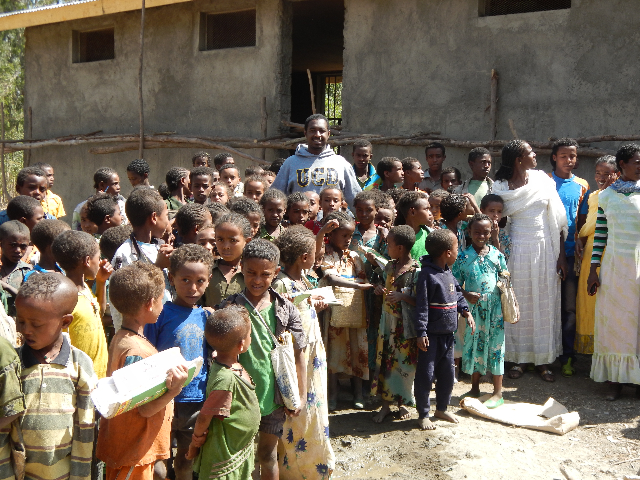After almost three long years of collecting thousands of recyclable bottles and redeeming them for cash, UC Davis’ Bottles for Poverty successfully raised enough funds in order to build a school in Gonder, Ethiopia this past April.
Started in 2011, Bottles for Poverty (BFP) is a club dedicated to raising funds in order to alleviate poverty, particularly in Ethiopia.
“Growing up in Ethiopia I’ve seen a lot of poverty, and I always felt responsible to do my part to help people there,” said Robel Haile, a managerial economics and international relations graduate student, and BFP founder. “I was thinking about an idea that would help me raise funds but at the same time galvanize students as well — so this idea just came to me one day. A lot of students drink and party, so they can at least donate their garbage and try to make a difference.”
From a small start of only six members, Haile said the organization has grown tremendously over the past few years, and now there are a good number of people who continuously drop off bottles at their 688 Bianco Court in Davis location.
After transferring to UC Davis in the fall, fourth-year international relations major and BFP Vice President Tyler Story became a part of BFP in January 2013.
“I was hooked on the ideals and mission of BFP,” Story said. “The simplistic idea of using recyclables to further education for children who did not grow up being as fortunate as those of us who have always had access to education really stuck with me.”
Fourth-year international relations major and BFP President Mana Azarmi became interested in the organization after meeting Haile in mutual classes her junior year.
“I think BFP offers a creative solution to the problem of fundraising on a college campus, with a fantastic end goal,” Azarmi said. “The process of building this school, meeting all of these great people and working with our incredibly talented BFP team has been very humbling and inspiring.”
The building of the school began in December and just recently finished in the beginning of April. Haile was able to fly to Ethiopia in order to oversee construction for a few months.
“It’s exciting to be there but at the same it was very depressing,” Haile said. “There’s just so much poverty and I felt like I wasn’t able to do much. I met a lot of kids who’ve never ever owned a pair of shoes in their life. Most of the kids are malnourished, and the place where we built the school — there are no roads, no electricity, no water. It was just overwhelming.”
Haile said the most important way of helping people in impoverished areas is through providing education.
“Giving these people education can open up doors,” Haile said. “They’ll be able to read more into whatever problems they have, be able to attend university, be able to come back and help their community solve their problems. For example, when most of these people are given a prescription for a medicine — they can’t even read it. Or if they knew to boil the water they get from the rivers, they wouldn’t get as many diseases — just simple things like that that can help transform their lives.”
Although females are typically put at a disadvantage and have to sacrifice their education in order to raise a family, Haile ensured that both girls and boys would attend school in Gonder. On top of that, the school is the only building in the area that is made of cement and cinder blocks; the rest are composed of mainly mud.
“It was great to see the kids so excited about the building,” Haile said. “They couldn’t wait for it to be done. The problem [before was] most of the classes were outside under a tree, so they had a little chalkboard, they sat on a stone, and that’s class. So you know, [now] it’s a classroom that has cinder blocks so that means even if it’s raining outside they can still go to school.”
Since the school opened enrollment for all ages has increased tremendously, providing a safe and stable environment for education that the children in the area would not otherwise have.
“I hope that the construction of the school will provide the community and it’s children with a lasting institution of education that will give them tools for improving not only their lives, but the lives of the people around them,” Story said. “I am not naive enough to think that this one school will solve all problems in the community but I’m hopeful that it can provide substantive positive change.”
Azarmi described the experience as both a “learning process” and “very surreal.”
“I still remember hearing about what Robel wanted to do with BFP and I am ecstatic that our initial goal has been met,” Azarmi said. “This school physically exists and is no longer a vision of what could be. It’s proof that young people, with our passion, energy and can-do spirit can come together and accomplish great things.”
Now that BFP has achieved their long-term goal of building a school in Ethiopia, their next project entails the construction of a well for the school and area.
“The fact that we’re building a well at this school benefits girls because they don’t have to walk too far to get water,” Haile said. “So the parents will think ‘if we send her to school at least she’ll bring water back,’ so it’s basically tricking people into sending their girls to school.”
ELLIE DIERKING can be reached at features@theaggie.org.
Courtesy photo.




